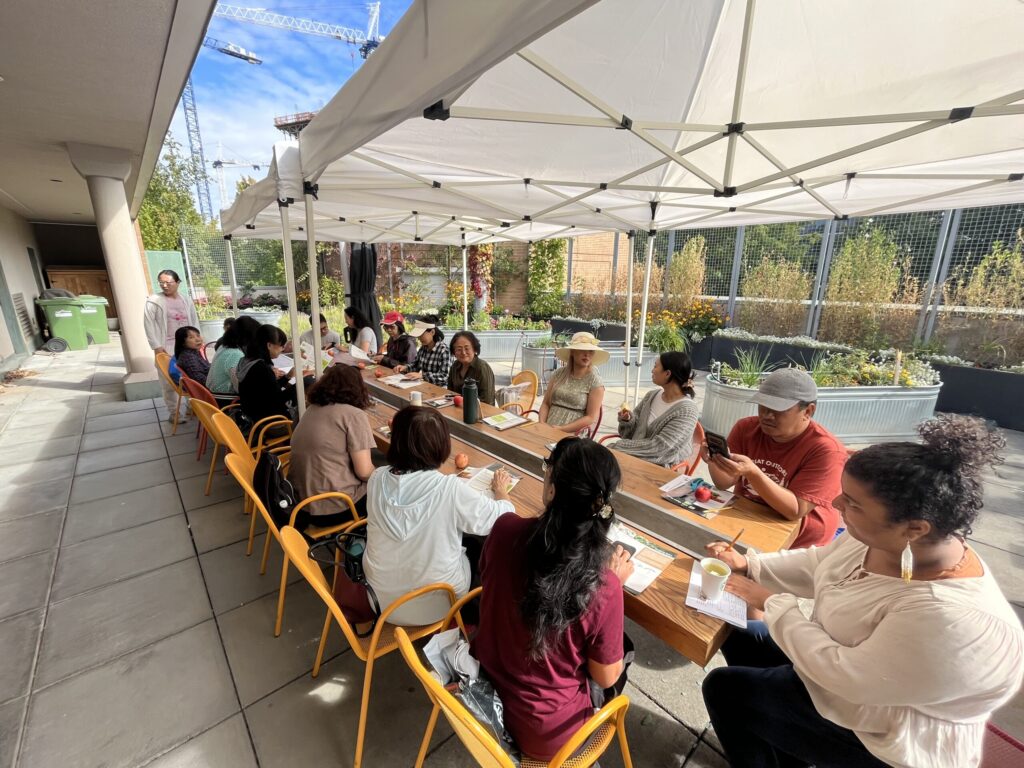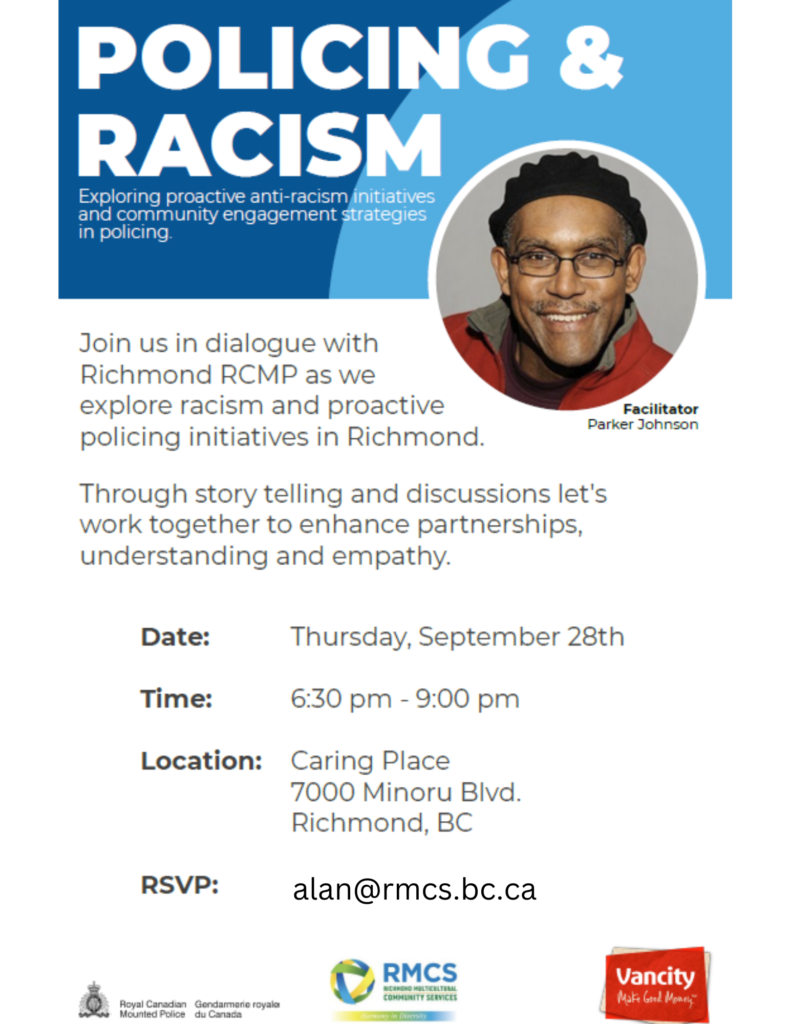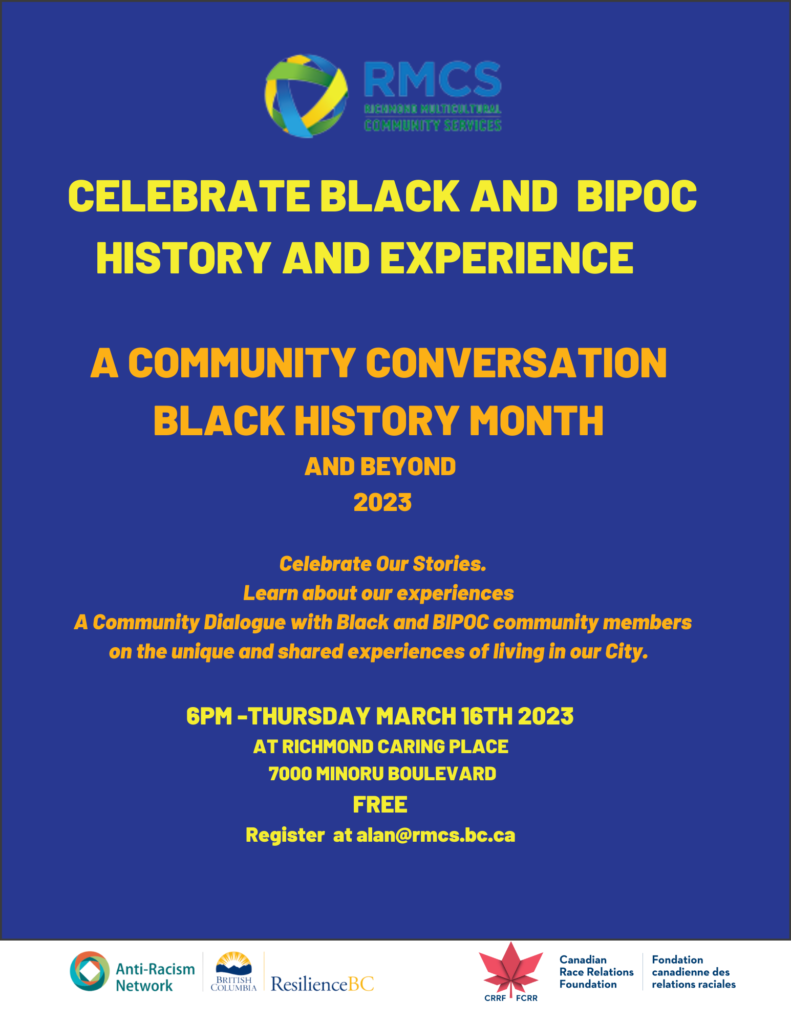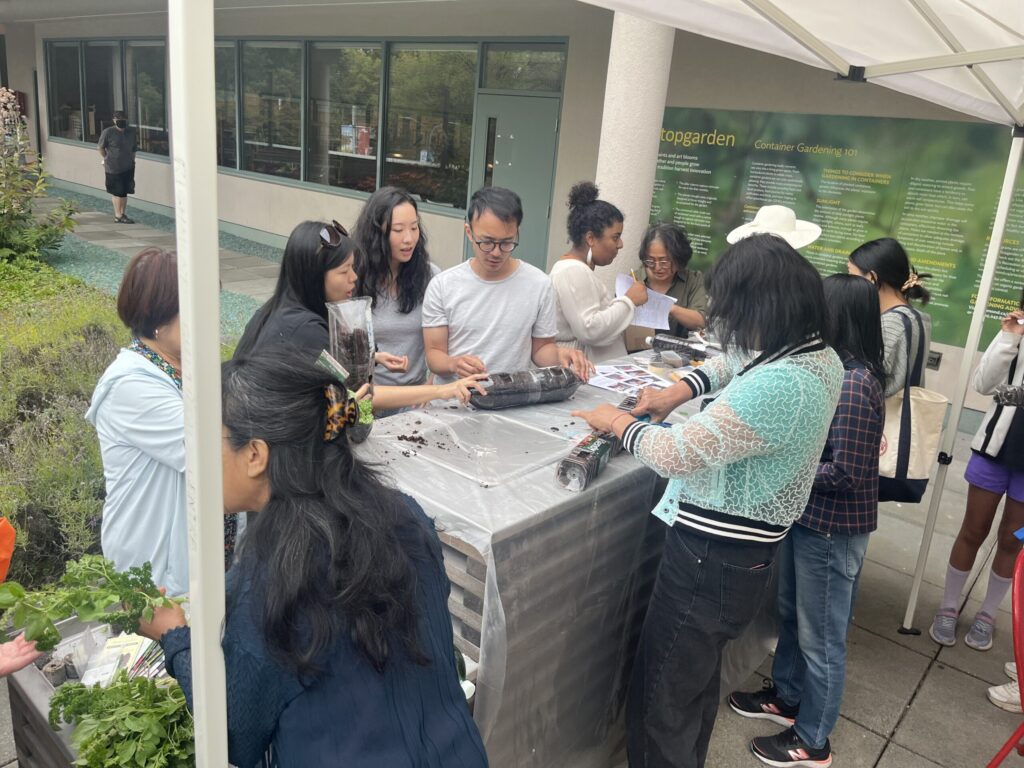Events
Interfaith dialogue and Storytelling event – June 2024
On Sunday 2nd June 2024, RMCS in partnership with Vancouver Playback Theatre, with financial support from Human Rights Interest, held an interfaith dialogue and storytelling event. Members of the Buddhist, Christian, Muslim, Highway to Heaven Committee, and Baha’i communities alongside members of the community from all backgrounds came together to build bridges, share experiences, and identify ways of working together to create a community for all.
Growing Food and Growing Community – September 2023
On Sunday 17th September, migrants and community members came together in a workshop organized by RMCS and Cinevolution with support from a BC Multiculturalism Grant, to learn to grow winter herbs and greens in small indoor spaces, and joined together in asking what it means to grow food ‘from home’ as a migrant in a new home?
The group explored how seeds and plants connect us across cultures and borders.

Led by Alisha Lettman participants learned how to grow winter herbs and greens in small indoor spaces using recycled materials and shared conversations about seeds, plants, and ways of growing food from home and made connections with other immigrants and newcomers, as well as long-time Richmond residents
Policing and Racism Forum – September 2023
In September 2023 RMCS/CCT facilitated a partnership event with the RCMP to discuss racism and policing in the community- and gain public input and RCMP input on partnership approaches to ways forward for all.

Notes from Policing and Racism
Hosted by Richmond Multicultural Community Services
September 28, 2023
6:30 pm-8:45pm
Alan Hill, RMCS
Gurbir Mondair, RCMP
Parker Johnson, Facilitator
Alan gave an informative overview of how this event came about, how it was based on findings from focus groups carried out with Richmond residents in 2022, where concerns around RCMP responses to racism were raised. Alan reported the good working relationship between RMCS and the RCMP and the new RCMP Diversity Team. Also copies of the final report “RMCS Anti-Racism Forums – October 2021-February 2022: Project Overview, which included key recommendations were shared with attendees.
This work also showed that in Richmond, nationally, during COVID and as populist politics became stronger, there was a spike in anti-Asian Racism and also a continuation of entrenched Islamophobia.
Gurbir provided an insightful and engaging overview of the work of RCMP in Richmond, especially as it related to hate crime response and reporting as well as victim services and multilingual staff to support the many cultural/linguistic communities. The ongoing efforts at diversity and inclusion, work in the schools, community, and media campaigns (hate has no place, mental health, high-risk youth, and more). RCMP officers get extensive DEI training and ongoing opportunities (some of which are required) to develop awareness, knowledge, and skills.
RCMP efforts in Richmond Public Schools (as SROs) and with youth include youth academy, sports and club engagement with youth in school and out of school, anti-gang and other proactive youth intervention programs including a partnership between the Ministry Of Children and Family Development and Richmond RCMP program known as Yankee 30.
People did express concern about police in schools, especially regarding armed police surveillance and the criminalization of youth. Gurbir assured those attending that officers were there in a supportive manner, to support the community and youth by preventing them from being captured by the criminal legal system. Youth activities were not typically developed into case files or data collected by police to create criminal records for youth. More clarity on data capture and the use of police interventions with youth is needed for transparency, trust, and accountability. RCMP does not capture any data to create criminal records unless the Youth is involved in a Criminal Code Offence. Not all youths who are suspected of committing a crime are charged under the Criminal Code as the Richmond RCMP has a robust Youth Intervention Program (YIP) and Richmond Restorative Justice Program.
• YIP: The Youth Intervention Program provides assessment, counselling, and/or referral services to youth who are 17 years and younger who have been identified as having actual or potential conflict with the law and are referred by an RCMP member. For those referrals that fall under the Youth Criminal Justice Act, the police officer can decide to allow the youth to learn more productive and socially acceptable behaviours and to understand the consequences of continued criminal behaviour.
The goals of the YIP program are to:
o Prevent the youth from committing further offenses
o Assist the family with resolving any underlying issues which may be contributing to problematic behaviour.
• Youth Restorative Justice Program: Restorative Justice consists Community Conference that brings together those affected by an incident where a child or youth has admitted guilt for committing a criminal offence. Conferences include the victims, offenders, their support persons, witnesses, and the referring police officer. Trained facilitators assist the participants in building an agreement that addresses the harm, and holds the child or youth accountable for their actions.
Work by RCMP with Indigenous youth, youth of color, and other marginalized youth is intentionally done to build better relationships with communities disproportionately impacted by police practices that may be viewed as biased.
We had an engaging and ranging discussion with the participants. Most attending did not have concerns or stories of trouble with the police and were supportive of policing in Richmond.
Some concerns raised
Councillor Chak Kwong Au, who had been in discussion with residents shared the following concerns:
• People of Chinese ancestry have a few concerns about racism in their interactions when reporting hate crimes, harassment, or abuse based on anti-Asian racism. They felt their concerns were minimized, dismissed, and denied. Some felt the police responded in ways that defended the perpetrator and minimized the harmful impact. They would hear responses such as: “he was probably drunk,” “he did not mean it,” “It was not that bad (compared to real crime),”
• RCMP officers, often once they had decided that an incident was not a hate crime, then did not explain this decision to the members of the public concerned and so the people involved often felt that the RCMP appeared to be endorsing racism and supporting the racist.
• Community members did not like the way officers questioned them and tried to document their reports of crime (hate, harassment, assault). RCMP did not respectfully allow community members to tell their experiences as they needed to.
The group also discussed workplace harassment, and when or if to involve the police. Questions arose regarding data collection, in-take process, and follow-up.
When is it appropriate to call the police about racism and hate and when not? The community member wanted to understand when it is a workplace issue for the employer to address compared to involving the police. In addition, the use of workplace policies and procedures like WorkSafe BC or Human Rights Commission needs to be clarified.
Gurbir reported that all racist incidents, hate related incidents should be reported. The RCMP take all these incidents seriously and unless people report them it is difficult to get a full picture of what is happening in the community and allocate appropriate resources.
Moving Forward:
Richmond RCMP is committed to addressing the concerns brought forward during this productive and frank discussion.
Gurbir will work collaboratively with the BC Hate Crime Team and hold training sessions. The concerns raised by attendees during this discussion will be addressed including but not limited to Communication strategies for officers when dealing with the complainant i.e. showing empathy and compassion during their interactions.
February 2023 – Black History Month

For BHM 2023 for Black History Month, RMCS and the CCT held an inclusive multi-community dialogue of Black and Asian community members.
A Black History Month Event and Community Conversation
This was an event for BLACK other BIPOC and Indigenous community members to share culture, beliefs and experiences- an event where culture was showcased and cultural similarities and differences were shared – and then also an exploration of barriers, racism, and cultural acceptance/ integrations- what that means practically and historically for communities
This event was an educational round table and celebration of Black and other BIPOC cultures
The event a) celebrated Black history and experience and b) BIPOC culture and contributions to Canadian, cultural, social, and political life.
A round table discussion highlighted the contributions of Black Canadians in Richmond by showcasing the work of key current and former community members- Black Canadians that do or have had a connection to Richmond BC and Metro Vancouver and ideas for action were generated.
BHM/Dialogue Event
Ideas for Action
• Be the change you want to be – ask yourself – what do you know about your neighbours?
• Reach out beyond your community- small acts of kindness
• Ask to review school curriculums to ensure diversity
• Observe and ask that all multicultural holidays are observed
• Insist that elementary schools do inclusivity training
• Ask organizations of all sorts to adopt the Richmond Community Protocol
• Roll out more bystander training – training on how to deal with a racist incident, how to speak up
• More dialogue on “what is a Canadian”
• Dialogue on “community – what does community mean”?
• More multicultural camps and workshops for kids
• Public recognition of diversity – statues, plaques, street names
• Recognition of DEAS Tunnel
• Build community by engaging new businesses in diverse communities
• Explore the needs of the African Refugee community in Richmond
• More staff in organizations that speak African languages
• More visible minority staff representation at City Hall
• Dialogue on intersectional links between racism/class/gender and socioeconomic status
• For a community committee to tackle racism
• Advise SD38 on institutional change/ curriculum change /help to facilitate student voices
• Apply a diversity lens to mental health care/the mental health crisis.
• Hold a monthly spotlight on communities and their issues.










